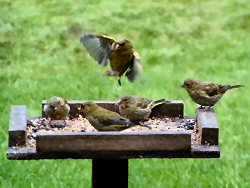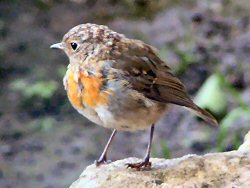This is one of my favourite times of year in the garden: summer is not yet over, but change is in the offing. For me, late summer and early autumn have a melancholy and exceedingly beautiful ambience.
 Greenfinches on the bird table.
Greenfinches on the bird table.
By melancholy, I certainly don't meant 'sad'; I just mean that it feels like a time for reflection on the summer just gone and for contemplation of the autumn and winter to come. The garden is certainly still a very vibrant place. At the moment there are huge numbers of birds coming to the feeders and the bird table (which I've just recommissioned after a summer spent in the garage). The finch and tit flocks all contain large numbers of juvenile birds and I'm also getting regular visits from a number of nuthatches (which my be a family party).
 Juvenile robin changing to adult plumage.
Juvenile robin changing to adult plumage.
Not so long ago, it was recommended that birds only be fed in the colder weather, but it is now recognised that feeding garden birds at this time of year can be of huge benefit in preparing the young birds (and the tired adults too) for the colder weather to come.
Now is a good time of year to start thinking about providing places for animals to spend the winter in your garden. This weekend I deployed a
hedgehog box in the hope that one of the hedgehogs which visit the garden might think it a suitable place to hibernate. When you are absolutely sure that birds have finished nesting, you can inspect your nestboxes, remove old nesting material (since soiled material can harbour disease and parasites) and put in a little straw to make the box an attractive roosting site for birds (and other animals) during the winter.
Although most people think of
renovating or putting up nestboxes in the spring, now is actually a great time to do it. Not only might birds use them for roosting in the winter, but they will have much longer to get familiar with them before the next breeding season starts.